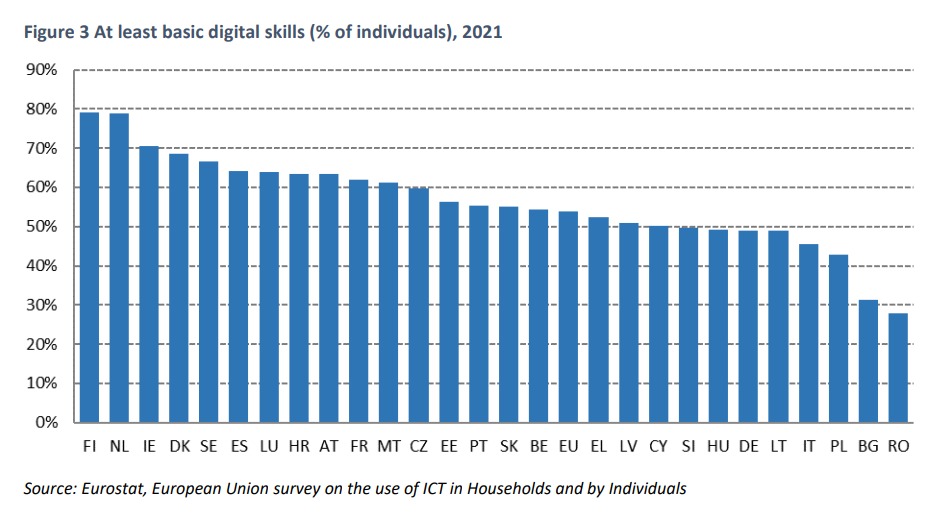On July 28 the European Commission released the new results of the 2022 Digital Economy and Society Index (DESI), which tracks Europe’s digital performance and the progress made by the EU countries every year.
The DESI 2022 reports are based mainly on 2021 data and track the progress made in EU Member States in digital. While EU Member States have made progress in their digitalisation efforts during the COVID-19 pandemic, they are still struggling to address the gaps in digital skills, turn SMEs into digital businesses, and put out cutting-edge 5G networks. Nevertheless, the EU has made a huge effort to support the digital transformation: with almost €127 billion earmarked for reforms and investments in the digital sector, the Recovery and Resilience Facility (RRF) presents an unmatched opportunity to accelerate the digital transformation that the EU and its Member States cannot afford to pass up.
A true digital transformation requires a decisive step forward in the acquisition of digital skills by citizens. People without the necessary digital skills run the risk of falling behind as digital technologies become a necessary component of daily life and participation in society. The data of the 2022 DESI report show that only 54% of Europeans aged between 16 -74 have at least basic digital skills. The Digital Decade target is at least 80% of citizens by 2030.

Furthermore, the EU’s 9 million ICT specialists also fall well short of the EU aim of 20 million specialists by 2030 and are not enough to address the skills shortages that businesses, SMEs and organisations are now experiencing, despite the fact that 500.000 ICT specialists entered the labour market between 2020 and 2021.
The 2022 results demonstrate that while the majority of Member States are making progress in their digital transformation, essential digital technologies like Artificial Intelligence (AI) and Big Data are still not widely used by enterprises. The deployment of connection infrastructure, particularly 5G, which is necessary for highly innovative services and applications, must come quickly. Finland, Denmark, the Netherlands and Sweden remain the EU frontrunners. However, even there the adoption of cutting-edge digital technologies, such as AI and Big Data, is still around 30%, which is well behind the objective of 75% set for the 2030 Digital Decade. This is also partly due to the significant skill shortages, which impede overall advancement and result in digital exclusion.
Nevertheless, there is an overall positive convergence trend: the EU continue to improve its level of digitalisation, and the Member States that began at lower levels are gradually catching up by expanding more quickly. In particular, Italy, Poland, and Greece significantly raised their DESI ratings over the previous five years by making consistent investments and sharpening their political focus on digital technology, which were also supported by European funding.
If you would like to find out how each country is scoring on the DESI index, you can explore the interactive map of Digital Skills, featuring key data, insights and actions on digital skills and jobs in each EU Member State.
© European Commission


